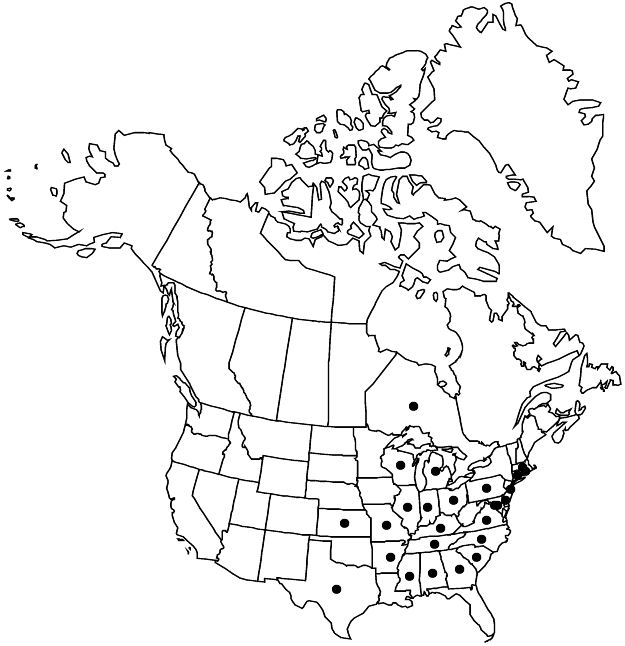Difference between revisions of "Euonymus fortunei"
Symb. Sin. 7: 660. 1933.
FNA>Volume Importer |
imported>Volume Importer |
||
| Line 42: | Line 42: | ||
|elevation=0–300 m. | |elevation=0–300 m. | ||
|distribution=Ont.;Ala.;Ark.;Conn.;Del.;D.C.;Ga.;Ill.;Ind.;Kans.;Ky.;Md.;Mass.;Mich.;Miss.;Mo.;N.J.;N.C.;Ohio;Pa.;R.I.;S.C.;Tenn.;Tex.;Va.;Wis.;e Asia. | |distribution=Ont.;Ala.;Ark.;Conn.;Del.;D.C.;Ga.;Ill.;Ind.;Kans.;Ky.;Md.;Mass.;Mich.;Miss.;Mo.;N.J.;N.C.;Ohio;Pa.;R.I.;S.C.;Tenn.;Tex.;Va.;Wis.;e Asia. | ||
| + | |introduced=true | ||
|discussion=<p><i>Euonymus fortunei</i> is widely planted as an ornamental and has escaped widely. Plants grow horizontally until they encounter a vertical surface like a rock, wall, or tree, which they then climb using adventitious roots. They sometimes form dense mats over other vegetation, excluding other plants.</p> | |discussion=<p><i>Euonymus fortunei</i> is widely planted as an ornamental and has escaped widely. Plants grow horizontally until they encounter a vertical surface like a rock, wall, or tree, which they then climb using adventitious roots. They sometimes form dense mats over other vegetation, excluding other plants.</p> | ||
|tables= | |tables= | ||
| Line 66: | Line 67: | ||
|publication year=1933 | |publication year=1933 | ||
|special status=Introduced | |special status=Introduced | ||
| − | |source xml=https:// | + | |source xml=https://bibilujan@bitbucket.org/aafc-mbb/fna-data-curation.git/src/bb6b7e3a7de7d3b7888a1ad48c7fd8f5c722d8d6/coarse_grained_fna_xml/V12/V12_440.xml |
|genus=Euonymus | |genus=Euonymus | ||
|species=Euonymus fortunei | |species=Euonymus fortunei | ||
Revision as of 20:09, 27 May 2020
Vines to 20 m. Stems prostrate to erect, climbing by adventitious roots; young branches terete, not corky winged. Leaves persistent; petiole 5–10 mm; blade lanceolate, ovate, elliptic, to broadly obovate-elliptic, 1–9 × 0.5–5 cm, base cuneate, acute, obtuse, to rounded, margins crenate-serrate, apex obtuse, acute, or acuminate. Inflorescences axillary, 5–15-flowered. Flowers: sepals 4; petals 4, white to pale green, oblong, 3–4 × 2–3 mm; stamens 4; ovary smooth. Capsules straw colored to orange, globose, 6–8 mm diam., unlobed or very shallowly 4-lobed, lobes clearly connate, surface smooth. Seeds ellipsoid, 4–6 mm; aril orange. 2n = 32.
Phenology: Flowering summer; fruiting summer–fall.
Habitat: Moist woods, stream banks, riverbanks, disturbed areas.
Elevation: 0–300 m.
Distribution

Introduced; Ont., Ala., Ark., Conn., Del., D.C., Ga., Ill., Ind., Kans., Ky., Md., Mass., Mich., Miss., Mo., N.J., N.C., Ohio, Pa., R.I., S.C., Tenn., Tex., Va., Wis., e Asia.
Discussion
Euonymus fortunei is widely planted as an ornamental and has escaped widely. Plants grow horizontally until they encounter a vertical surface like a rock, wall, or tree, which they then climb using adventitious roots. They sometimes form dense mats over other vegetation, excluding other plants.
Selected References
None.